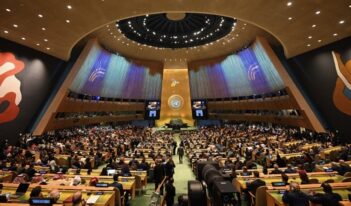
Politicians and academics wrestle over gender equality and the future of the French language.
The French cry of liberté, egalité, fraternité sometimes rings hollow to those who feel that the strict gender rules of the French language discriminate against women.
A recent French history textbook defies those rules by introducing gender-neutral words. The textbook’s “inclusive” French inspired praise from some professors and teachers, but drew swift rebukes from the official French language authority, the Académie Française, as well as from French Prime Minister Édouard Philippe.
The debate over the textbook authors’ use of gender-neutral terms mark the latest battle in a struggle over the future of the French language.
The textbook, Magellan and Galileo – Questioning the World, is at first glance an unlikely battlefield. Designed to teach history to third graders, it was released by the Paris-based Lagardère Group, a multibillion dollar corporation known for publishing bestselling authors from J.D. Salinger to J.K. Rowling. And the gender-neutral vocabulary changes it introduces—alleged by the Académie to be revolutionary—are rather simple.
In French, most nouns have a masculine and feminine form. For example, a male driver is a conducteur and a female driver is a conductrice. An official rule dictates that the masculine always takes precedence over the feminine. Thus, a group of female drivers is a group of conductrices. If that group includes even a single male driver, however, it is a group of conducteurs—even if there are 99 women and only one man in the group.
The textbook upends this official rule by stating that a mixed gender group should include both masculine and feminine forms. For example, a group of male and female drivers should be conducteur.rice.s or conducteur-rice-s. The publisher argues that these forms are “inclusive” and promote gender equality.
Some scholars and writers praised the development. Journalist Meaghan Beatley called it “a way to dismantle the patriarchy through a bloodless spelling revolution.” A coalition of 314 French professors and schoolteachers declared in an op-ed that they would no longer teach the rule that the masculine trumps the feminine, stating their support for inclusive French instead.
The Académie Francaise, however, found the changes heretical.
In a scathing rebuke, it called inclusive writing an “aberration” that “borders on illegibility” and puts the French language “in mortal danger” around the world.
The Académie’s response is significant because it is the official arbiter of what is and is not—technically—French. Founded by Cardinal Richelieu in 1635, it consists of 40 French intellectuals known as The Immortals. The Immortals catalog the grammar and vocabulary of French, determining which contemporary words and phrases can be admitted into the language. Their charter calls for them to “clean the language of all the filth” and keep it “pure.”
The Immortals—who serve for life and are overwhelmingly men—have vigorously opposed attempts to promote gender inclusiveness in the French language.
Reforms first became popular in Canada in the 1970s, where Québécois scholars created feminine job titles for professions that had previously had only masculine titles. French political leaders followed suit in the 1980s and 1990s, when female government ministers asked to be called madame la minister—“la” signifying feminine—rather than the conventional and masculine madame le ministre.
The Perpetual Secretary of the Immortals at the time, Maurice Druon, allegedly commented in response, “Socialist ideology is making France go to pot, and the French language with it.”
This year, Immortal Sir Michael Edwards called gender-inclusive words “gibberish” and “chopped-up, erroneous French.”
Prime Minister Édouard Philippe joined in the Immortals’ critique, forbidding government employees from using gender-inclusive words and declaring that “the masculine is a neutral form that should be used for terms applicable to women as well as men.”
At least some critiques of the proposed gender-inclusive words focused on practical concerns rather than linguistic politics. One schoolteacher in the Loire explained that her students— primarily the children of immigrants—already had a difficult time learning French and that the complexities of inclusive writing would make it tougher. Instead, she said, “if the goal is to erase the difference between the masculine and the feminine…that should be done through education and not by changing spelling.”
Others, however, argue that the difficulties are worthwhile. “Language isn’t just a way of communicating,” commented Eliane Viennot, a professor of literature at Jean-Monnet University. It also “expresses how we see the world and transmits our vision of society. We want to use language to make women more visible,” she noted.



